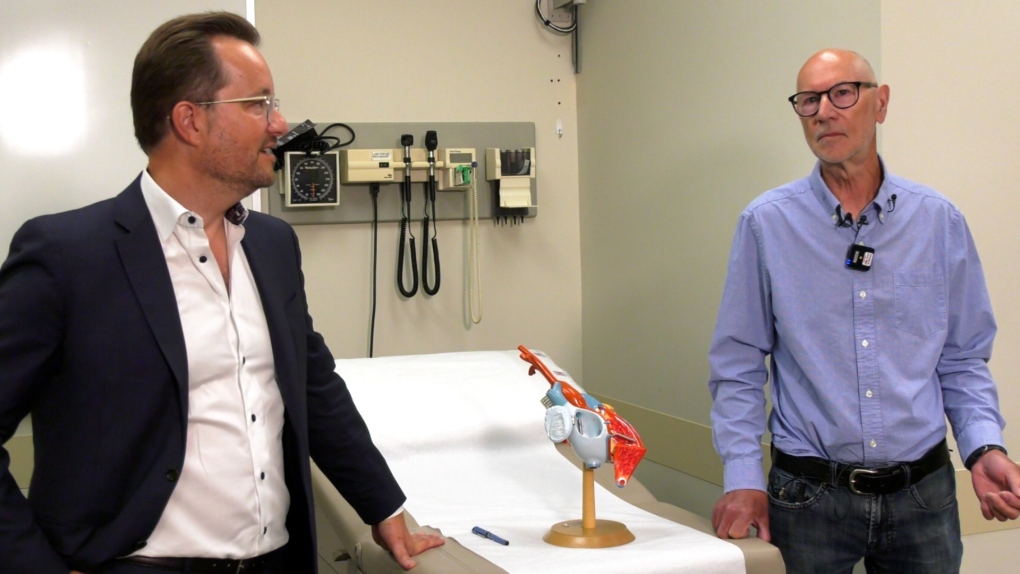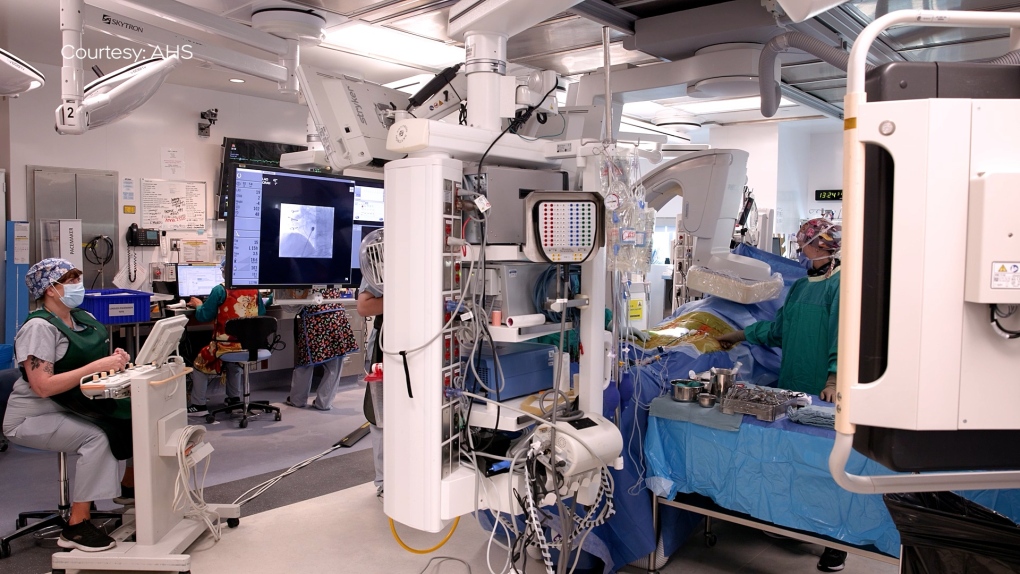Alberta man sees big benefits after receiving leading-edge pacemaker at Calgary hospital
Just two weeks after receiving a pacemaker in May, 77-year-old John Kebert was able to get back to his hikes he had missed so much.
The Albertan is one of 15 people at Calgary's Foothills Medical Centre (FMC) who have received one of the world's first leadless, dual-chamber pacemakers.
It's called an AVEIR DR and it's currently only available at the FMC and Montreal Heart Institute in Canada.
The AVEIR DR is smaller than a traditional pacemaker – about one-tenth of the size – and is implanted through a person's leg instead of directly into someone's chest during major surgery.
The new device has a recovery time of days instead of up to two months for a traditional pacemaker.
"I had the original pacemaker for a single chamber and I found hiking up mountains wasn't as good as it could be," Kebert said Monday, about three months after his procedure.
"I would run out of breath when I was getting close to the top. Now, since I've had the (dual-chamber device), I'm a lot better at hiking."
Dr. Derek Exner is a heart rhythm specialist at the Foothills and says the new device allows patients who are prone to complications or infection to receive the care they need.
"What they do is, they replace the heart's electrical system. So if your heart's going too slow, you're having problems with getting shorter breath or fainting, this replaces the electrical system and brings you back to a normal life," Exner explained.
 Albertan John Kebert, 77, (right) has the leadless AVEIR DR pacemaker. Dr. Derek Exner, a heart rhythm specialist at the Foothills Medical Centre is seen to Kebert's left. The AVEIR DR has a battery life of about ten years and is leadless, meaning it doesn’t have the wires a traditional pacemaker has.
Albertan John Kebert, 77, (right) has the leadless AVEIR DR pacemaker. Dr. Derek Exner, a heart rhythm specialist at the Foothills Medical Centre is seen to Kebert's left. The AVEIR DR has a battery life of about ten years and is leadless, meaning it doesn’t have the wires a traditional pacemaker has.
The procedure to get the dual-chamber device into someone's heart takes "just minutes," the doctor said, and the patient is typically able to walk out of the hospital the same day.
"Typically, with a traditional pacemaker, we ask people not to move their arm for about a month, month and a half," Exner said. "So you're pretty restricted. You can't go swimming. You can't do a lot of outdoor activities."
The new device and procedure – which was researched and launched in Calgary – sees people bouncing back much quicker.
"They're back to doing normal activities within a day or two. And they might be doing more vigorous activities within a week or two," Exner said.
 As of August 2024, 15 patients have received the leadless AVEIR DR pacemaker at Calgary's Foothills Medical Centre. For now, the new device is reserved for people in research studies or people who are high-risk for infection.
As of August 2024, 15 patients have received the leadless AVEIR DR pacemaker at Calgary's Foothills Medical Centre. For now, the new device is reserved for people in research studies or people who are high-risk for infection.
The AVEIR DR also costs much more than a traditional pacemaker, the doctor said.
The hope is to bring the device and procedure to more cities across the country and the world.
"There's huge demand for it. So the places outside of Calgary, Montreal, they don't have access to it and they're not terribly happy about it. Everyone wants to have access to this," Exner said.
CTVNews.ca Top Stories

Back on air: John Vennavally-Rao on reclaiming his career while living with cancer
'In February, there was a time when I thought my career as a TV reporter was over,' CTV News reporter and anchor John Vennavally-Rao writes.
The winter solstice is here, the Northern Hemisphere's darkest day
The winter solstice is Saturday, bringing the shortest day and longest night of the year to the Northern Hemisphere — ideal conditions for holiday lights and warm blankets.
Poilievre writes to GG calling for House recall, confidence vote after Singh declares he's ready to bring Liberals down
Conservative Leader Pierre Poilievre has written to Gov. Gen. Mary Simon, imploring her to 'use your authority to inform the prime minister that he must' recall the House of Commons so a non-confidence vote can be held. This move comes in light of NDP Leader Jagmeet Singh publishing a letter stating his caucus 'will vote to bring this government down' sometime in 2025.
School custodian stages surprise for Kitchener, Ont. students ahead of holiday break
He’s no Elf on the Shelf, but maybe closer to Ward of the Board.
Kelly Clarkson's subtle yet satisfying message to anyone single this Christmas
The singer and daytime-talk show host released a fireside video to accompany her 2021 holiday album, “When Christmas Comes Around” that she dubbed, “When Christmas Comes Around…Again.
Judge sentences Quebecer convicted of triple murder who shows 'no remorse'
A Quebecer convicted in a triple murder on Montreal's South Shore has been sentenced to life in prison without chance of parole for 20 years in the second-degree death of Synthia Bussieres.
At least 2 dead, 60 hurt after car drives into German Christmas market in suspected attack
A car plowed into a busy outdoor Christmas market in the eastern German city of Magdeburg on Friday, killing at least two people and injuring at least 60 others in what authorities suspect was an attack.
16-year-old German exchange student dies after North Vancouver crash
A 16-year-old high school student from Germany who was hit by a Jeep in North Vancouver, B.C., last weekend has died in hospital, authorities confirmed.
Poilievre to Trump: 'Canada will never be the 51st state'
Conservative leader Pierre Poilievre is responding to U.S. president-elect Donald Trump’s ongoing suggestions that Canada become the 51st state, saying it will 'never happen.'


































